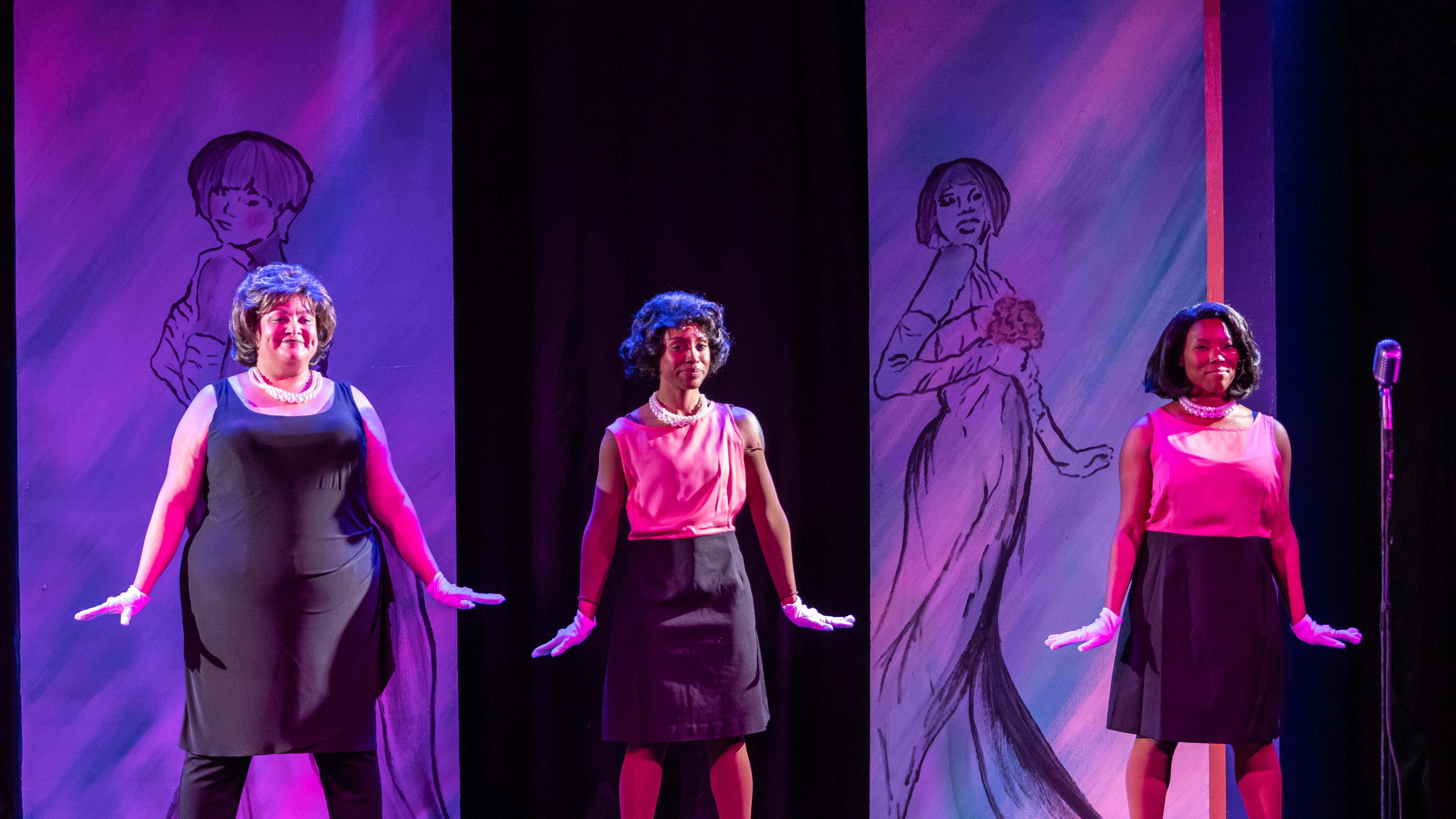Forget the sequins and feather boas.
Unlike the glitzy 1981 Broadway show Dreamgirls, Don Horn’s new musical, Flo, which he wrote with help from his friend, the late Mary Wilson, and directed for Triangle Productions, tells an intimate story about Florence Ballard, one of the founding members, with Wilson, of the iconic girl group the Supremes.
The play starts simply, with Flo (Abigail Lawrence) addressing the audience some time after her death of a coronary thrombosis at age 32. Instead of standing onstage, she’s level with them as she warmly recalls growing up in Detroit in the 1940s and ‘50s, where her mother put DDT in Flo’s hair to kill lice, and her father taught her to sing.
This straightforward beginning unfolds before two screens projecting black-and-white photos of the Brewster-Douglass Housing Projects, where fellow singers Mary Wilson (Bri-Skye McKizzie) and Diane Ross (Lydia Fleming) also lived. Horn could have amped up the drama throughout the production by depicting Flo’s later alcoholism and the missed rehearsals that led to the end of her career as a Supreme in 1967, but he has something kinder in mind, focusing on the friendship of music-loving teens before they worked their way to the Top 40.
As driven as they are, the trio supports each other. Flo, who at 15 becomes the first member of a new group called the Primettes, instantly invites Mary to join her and then welcomes both Betty McGlown (Essence Fleming) and Diane as well. Likewise, Mary bears no ill will when their singing teacher favors Flo’s big voice. Diane, whose voice has a reedier sound, is visibly irked by Flo’s early prominence in the Primettes, but her concern for her friend feels real when Flo’s father dies at age 54, and she even offers to sing at his funeral.
It’s a pivotal moment in the play. Where before we mostly hear snippets of songs, now we’re treated to a lovely and hypnotic full-length rendition of “P.S. I Love You,” with Diane demonstrating a newfound soulfulness. From this point on, the play finds its rhythm as it relies on music more than narration to show how its characters mature.
In the beginning, the two youngest members, Mary and Diane, are dressed in schoolgirl skirts and white sneakers while the group sings “Silent Night.” As the play progresses, though, the group graduates to wearing pearls and white gloves, and Diane gradually morphs into the superstar she’s destined to become. We see this as she moves her hips and melts into the lyrics of “You’re Doing Me Wrong,” while Flo, singing backup, wears a subtly disgruntled expression.
It’s refreshing that the girls’ ambition isn’t portrayed as a vice. While Flo and Diane both long to be sole lead singer, Horn doesn’t paint either of them as a villain. As Betty, who’s relegated to background vocals for the song “Night and Day,” says, “That’s a lot of night and days.”
Tensions naturally mount among the singers, and even the good-natured Mary rolls her eyes when Diane announces she’s now “Diana.” When Motown Records founder Berry Gordy (Ken Dembo) signs the girls to a contract, he tells them to also change the name of their group (they settle on the Supremes) and starts giving Diana preferential treatment. Still, Horn suggests it was an earlier sexual assault that started Flo’s downward spiral.
Once again, his simple staging adds significance to the event. Flo is waiting for her brother to take her home from a sock hop when we hear the sound of a car drive up and a male voice offering her a ride. Then, from offstage, we hear Flo’s voice repeating “no,” leaving us to imagine the rest.
The play ends in 1964, but Wilson later said in interviews that she believed Flo was never the same after the attack and that it contributed to her alcoholism.
Like the Supremes themselves, this production has suffered setbacks, including some late-in-the-game casting changes that make some of the performances less polished than they could have been. The resilient cast and crew, though, fulfills a vow Horn once made to Wilson to tell a human story without, as she said, “Hollywoodizing” it.
With the final song of the show, “Where Did Our Love Go,” he keeps that promise for all three of the remaining Supremes. Diana is up front, but Mary and Flo face each other in the background and beam with the joy of singing.
SEE IT: Flo plays at Triangle Productions, 1785 NE Sandy Blvd., 503-239-919, trianglepro.org. 7:30 pm Thursday–Saturday, 2 pm Sunday, through June 16. $15–$35.
